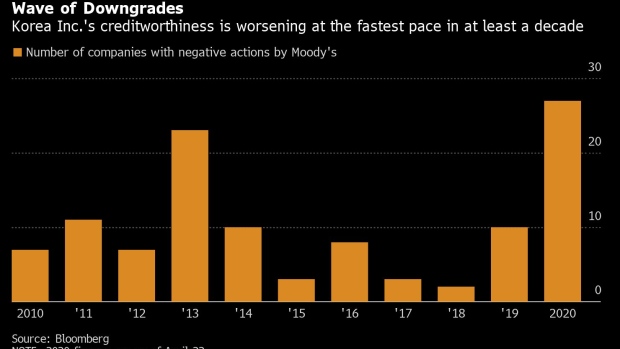Apr 22, 2020
Korea Inc. Credit Outlook Worst in Decade Despite Virus Success
, Bloomberg News

(Bloomberg) -- South Korea has been a success story so far in the global fight against the coronavirus, but troubles for its export-reliant corporate borrowers may just be starting.
As companies worldwide face a near unprecedented rate of downgrades, Korea Inc. is also vulnerable: debt assessors have taken the most negative actions on the firms this year in at least a decade. The problem is that while Covid-19 cases are falling at home, the outbreak is still raging abroad and that’s bad for some of the country’s biggest companies that are major exporters.
Korea’s example highlights how a country that has the virus relatively under control may still see massive damage to its corporate sector due to a global economic slowdown and disruptions to supply chains. While Korea was one of the worst-hit nations in the early stages of the outbreak, new cases have fallen to the least since late February without lockdowns or travel bans, after authorities relied instead on a massive testing and tracing regime.
“The firms may face rising funding costs due to the downgrades, adding to pressures,” said JunHong Park, Hong Kong-based lead analyst for Korean corporates at S&P Global Ratings. “Some directly-hit sectors such as airlines or hotels and some debt-saddled companies may face liquidity risks.”
Moody’s Investors Service has cut the credit ratings or outlooks of nine Korean firms and placed 18 on review for downgrade so far this year, already marking the most negative actions since at least 2010, Bloomberg-compiled data show. S&P also took similar actions on 14 companies, the most in at least a decade as well. Neither firm has upgraded a single company.
Read more: Korea Inc. Returns to Debt Market as Virus Fears Stay High
The fact that the Korean firms evaluated by global rating companies are mostly investment-grade blue-chip issuers suggests that smaller businesses are struggling even harder and some of them may not be able to survive without government support.
Even before the virus outbreak, Korean corporate ratings were pressured due in part to a glut of goods such as LCD panels, oil refining products and steel that some of the companies sell, and also because of high investment needs at certain firms.
Now their prospects look even more troubled. The latest to be downgraded was Hanjin International Corp., a hotel-operating unit of Korean Air Lines Co., to CCC+ from B- by S&P last week. The rating firm said Hanjin faced significant pressure to meet its debt maturities over the next six months as the coronavirus pandemic has hampered its operations and debt capital markets have become increasingly risk averse.
Other companies that have been faced negative credit actions by S&P this month include Mirae Asset Daewoo Co., Hyundai Motor Co., Hyundai Steel Co. and Hyundai Glovis Co.
©2020 Bloomberg L.P.